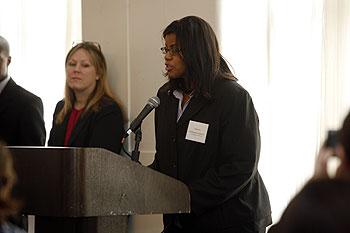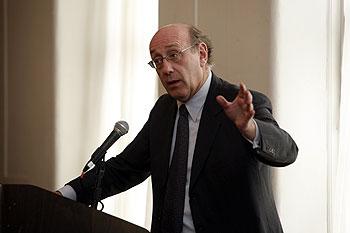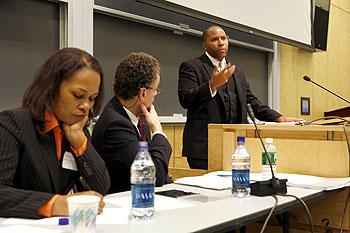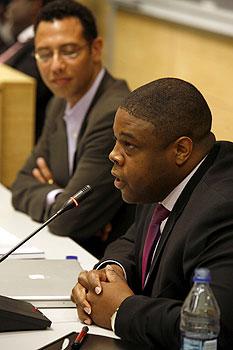CLS BLSA Paul Robeson Conference
CLS BLSA Paul Robeson Conference, Hurricane Katrina Revisited:Continuing Obstacles and Hope for the Future
By Jim Freeman
Hurricane Katrina revealed a city that failed to meet the needs of its poor citizens in ways that reached far beyond emergency planning to areas like public housing, criminal justice and basic civil rights.
"There’s no such thing as a "post-Katrina issue"; it’s just a more acute continuation of issues that existed before the storm," said Damian Hewitt of the NAACP Legal Defense Fund, at Columbia Law School’s 13th annual Paul Robeson Conference. New Orleans is being rebuilt with the same patterns of segregation and racial discrimination that characterized the city before the disaster, said Hewitt, who spoke on a panel called Post-Katrina: Challenges and Integrated Solutions that Use Litigation, Legislation, and Activism. The panel was moderated by Professor Conrad Johnson.
Lionel McIntyre, director of the Urban Technical Assistance Project at the Columbia Graduate School of Architecture, said the Katrina tragedy was not so much a systemic breakdown, but a callous decision to let the market sort out the costs of risk. After the hurricane, for example, derelict properties within New Orleans on which FEMA housing trailers could have been situated were kept empty so that the land would be available to speculators. This also led to more residents being housed outside their neighborhoods, thus hindering efforts to recover homes and belongings.
Land speculators received another boost when the city housing authority used Katrina as an excuse to propose demolishing old public housing and employing redevelopment schemes that favored middle- and upper-income citizens, said Ross Bricker, partner at Jenner & Block.
Bricker, who is co-lead counsel in a case against the City of New Orleans Housing Department and the Department of Housing and Urban Development, said he and his legal team discovered that both city and federal housing agencies, when sending letters to public housing residents giving notice of the agencies’ plans to redevelop certain projects and transfer former residents, addressed the letters to the very projects residents were barred from returning to after the hurricane. The agencies then claimed that, because residents hadn’t responded, they weren’t interested in returning, and went forward with their plans to demolish and redevelop.
The situation also involves breach of lease and breach of contract claims, though in this case it is residents who are the plaintiffs, claiming that the city has wrongly broken leases. Pointing to the agencies’ failure to reopen vacant public housing units more than 16 months after the hurricane, coupled with the inadequacies of "disaster assistance" housing vouchers given to former residents seeking new homes in a high-priced and scarce rental market, the plaintiffs claimed the agencies had violated their basic right to continued public housing assistance and to timely repairs as provided under their leases. The judge dismissed the plaintiffs’ traditional civil rights claims of disparate impact and disparate treatment, terms which identify that a government’s actions were discriminatory. However, he preserved these contractual claims for trial, which is pending this fall.
Homeless residents who have attempted to find housing on their own have also faced obstacles, according to James Perry, director of the Greater New Orleans Area Fair Housing Action Center. The center brought one case challenging Internet real estate ads – directly linked from government resettlement web sites – that stated, bald-faced, "white applicants only." The ads were removed voluntarily once administrative complaints were filed.
The center also successfully challenged an ordinance in St. Bernard parish, adjacent to New Orleans, that restricted renting property to blood relatives of property owners – a move that, with 93 percent white ownership parish-wide, guaranteed a virtual exclusion of people of color, said Perry. The ordinance was revoked during litigation.
During a lunchtime presentation at the conference, which was sponsored by the Law School’s Black Law Student Association (BLSA), Columbia Law School Lecturer-in-Law Kenneth Feinberg compared the national responses to Hurricane Katrina and to 9/11. Feinberg, who served as special master of the September 11th Victim Compensation Fund, contrasted the swift, bipartisan effort to create a compensation fund following 9/11 with the "resounding silence" in Congress on a fund for Katrina victims. The 9/11 Fund, he said, was "a unique response to an unprecedented national calamity" that was such an aberration from normal compensation schemes that it was unlikely to be repeated.
However, the absence of government and private aid following Katrina was compounded by neglect and irresponsible policies before the storm, said Feinberg. He cited the widespread lack of insurance by many New Orleans homeowners.
"It was scandalous – why didn’t the banks holding mortgages require coverage?" he asked.
Also discussed at the conference was the well-documented collapse of an already ailing prison system. According to Tulane Law School Professor Pamela Metzger, a great many prisoners didn’t have lawyers representing them before the storm "and when Katrina rolled in, there were men, women and children sitting in [correctional facilities], and we didn't even know who they were." That meant that countless people languished in jail for weeks, without being charged and without any form of legal aid.
The need for public defense in New Orleans – a city whose per-capita incarceration rate was the highest in the nation – is enormous, she added. The storm revealed a public defender- system that is horribly insufficient and almost completely broken.
Metzger lauded the work of law students from across the nation who responded to the crisis. Many students came to the Gulf Coast via the Student Hurricane Network, co-founded by Leila Hlass ’06, currently an associate at Chadbourne & Park. The network organized the first law student trip down to New Orleans during the winter break of 2005-6 and, to this day, has brought 2,700 law students to the Gulf area to work with non-profit organizations and public defender offices.
Also praising student efforts was panelist Judith Browne-Dianis ’92, who spoke on the litigation and activism panel. As co-director of the Advancement Project, which gives technical and legal assistance to grassroots groups, she is currently working to build coalitions between New Orleans natives and migratory workers, who are both often pitted against each other "in a ‘race to the bottom’ for low-wage, high-risk demolition and construction jobs."
The situation in New Orleans, said Browne-Dianis, "is about race and class, and about who lives in [the city] and who has to live [outside of it]."
The Robeson conference benefited from the assistance of many people, among them Professors Mary Zulack and Olati Johnson and students Maame Agyeiwaah, Aden Allen, Alanna Frisby, Tayo Giwa, Heather Mitchell, Uzoma Nkwonta, and Ikhlas Rashid, all Class of 2008.
Jim Freeman is a freelance writer who formerly practiced environmental justice and land use law.
Jim Freeman is a freelance writer who formerly practiced environmental justice and land use law.
Ashley Scott '08 addresses the audience at the lunch panel. Also pictured is Gail Heatherly, director of academic counseling and student organizations.
Columbia Law School Lecturer-in-Law Kenneth Feinberg
Damian Hewitt (at podium) of the NAACP Legal Defense Fund spoke on a panel called Post-Katrina: Challenges and Integrated Solutions that Use Litigation, Legislation, and Activism. Also pictured are panelist Judith Browne-Dianis of the Advancement Project and moderator Professor Conrad Johnson.
James Perry, director of the Greater New Orleans Area Fair Housing Action Center
PHOTOS BY DIANE BONDAREFF



